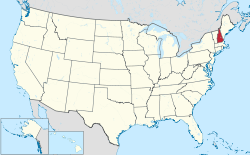NH Exit
This article has multiple issues. Please help improve it or discuss these issues on the talk page. (Learn how and when to remove these template messages)
|
#NHExit | |
|---|---|
| Motto: NH Out of US | |
 New Hampshire, United States | |
| Government | |
• Director of Operations | Caleb Q. Dyer |
• Director of Public Relations | Dave Ridley |
• Chief Organizer | Christopher Gronski |
The #NHExit movement is a secession movement in the United States state of New Hampshire. It was started in 2016 following the British referendum on leaving the European Union. The #NHExit movement aims to hold a referendum under Art. 100, sec. B of the New Hampshire Constitution to introduce an amendment to Art. 7 to remove all reference to the delegation of authority to the United State Congress.
Etymology
- NHExit comes from the common hashtag used to refer to the British referendum on leaving the European Union: #Brexit.
History
The #NHExit movement is not the first time the question of independence has been put before the legislature. In 2009, House Concurrent Resolution 6 (HCR6) was introduced. This resolution was loosely based on the Kentucky and Virginia resolutions and sought to establish conditions under which the state of New Hampshire would initiate a process to seek remedy in the form of non-participation in the reformation of the federal government by the several states.
Culture
There is a strong culture of independence in New England; notably in the states of Vermont and New Hampshire. In April of 1772, the first major act of insurrection against the crown occurred in Weare, NH. Ebeneezer Mudgett, a local lumber yard owner, was found to have been in gross violation of a law mandating that all 'mast pines', or trees greater than 12" in diameter, must be set aside for royal use and marked with a broad arrow. Mudgett was arrested by the Sheriff of Hillsborough and his Deputy and subsequently released on the condition he would post his bail the next morning. That night Mudgett led a score of men to the Pine Tree Tavern where the Sheriff and his Deputy were lodged and proceeded to strike them with switches of pine for each tree contested. After the assault the men forced the Sheriff and his Deputy to ride back to Derryfield. This event came to be known locally as the Pine Tree War and across the colonies as the Pine Tree Riot. To this day the white pine serves as a symbol of the independent spirit of the northern New England states. Four years later, on June 2, 1776, New Hampshire became the first British colony to declare independence and adopt a Constitution.
In 1777, Vermonters adopted a provisional Constitution. Due to conflicting claims on the land by property owners in New York and New Hampshire, Vermont was not admitted as a state under the Articles of Confederation government. Instead Vermont became a sovereign republic known at the time as the State of Vermont or l'État du Vermont in French. During this time Vermont's militiamen were active participants on behalf of the Continental Army in the American Revolutionary War despite their government never actually having declared war. This caused some strife with Vermonters hoping to keep favorable ties with the British governors of Québec in the event that the colonies lost the war for independence. Ultimately in 1791, Vermont became the 14th state to ratify the United States Constitution.
Another sovereign republic arose in New Hampshire some years later during a land dispute between Halls Stream and the Connecticut Lakes. In July 1832, after a border dispute causing confusion between tax collectors from both the British province of Québec, Lower Canada and the American state of New Hampshire, the citizens, not taking kindly to threats of double taxation, declared their independence. The resulting state was the Republic of Indian Stream or la République du Ruisseau Indien in French. The government served roughly 300 people from just north of Stewartstown, NH all the way to what is today Pittsburg, NH. The republic was disbanded in 1835 when the Sheriff of Coös called upon the militia to assemble in Stewartstown and issued an ultimatum to the Council of Indian Stream to cede control to the state of New Hampshire or face invasion. The border dispute would ultimately be resolved with the Webster-Ashburton Treaty of 1842.
Notable Supporters
Notable supporters of New Hampshire independence include:
- Hon. Daniel Itse, incumbent State Representative (R-Fremont)
- Hon. Glen Aldrich, incumbent State Representative (R-Gilford)
- Hon. Michael Sylvia, incumbent State Representative (R-Belmont)
- Hon. Keith Ammon, incumbent State Representative (R-New Boston)
- Hon. Max Abramson, incumbent State Representative and candidate for Governor (R/L-Seabrook)
- Hon. Mark Warden, former State Representative (R-Goffstown)
- Hon. Michael Garcia, former State Representative (D-Nashua)
- Hon. Donald Gorman, former State Representative (L-Deerfield)
- Ian Freeman, radio talk show host and two-time candidate for Governor (D-Keene)
- Daryl W. Perry, candidate for President of the United States (L-Keene)
- Carla Gericke, candidate for State Senate (R-Manchester), lawyer and plaintiff in the matter of Gericke v. Begin, president of the Foundation for New Hampshire Independence
- Jason Sorens, PhD. professor at Dartmouth College and Founder of the Free State Project
- Kirk McNeil, owner of Area 23 Pub in Concord, NH
- Randy Clemens, professional chef and best-selling author

